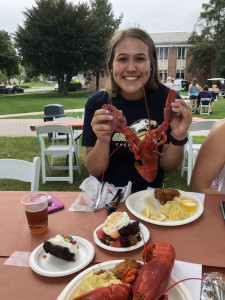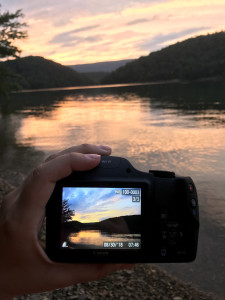Recent Posts
Categories
Student Senate Means Business
Clack! A gavel at the front of the room hits the wood table, and the sea of chatter surrounding you slowly dwindles into silence. You look to your left, and then to your right, only to find students just like yourself dressed in semi-formal attire. Their attention is aimed at a PowerPoint slide titled “Student Senate Meeting – 10/1/18.”
As you might’ve guessed, this is a typical Student Senate meeting here at Juniata. Every two weeks, representatives from each class, different committees, and select other groups on campus come together to discuss solutions to issues facing students. Often times, there will also be a member of the administration presenting on pressing matters or giving senators the most up-to-date-information.
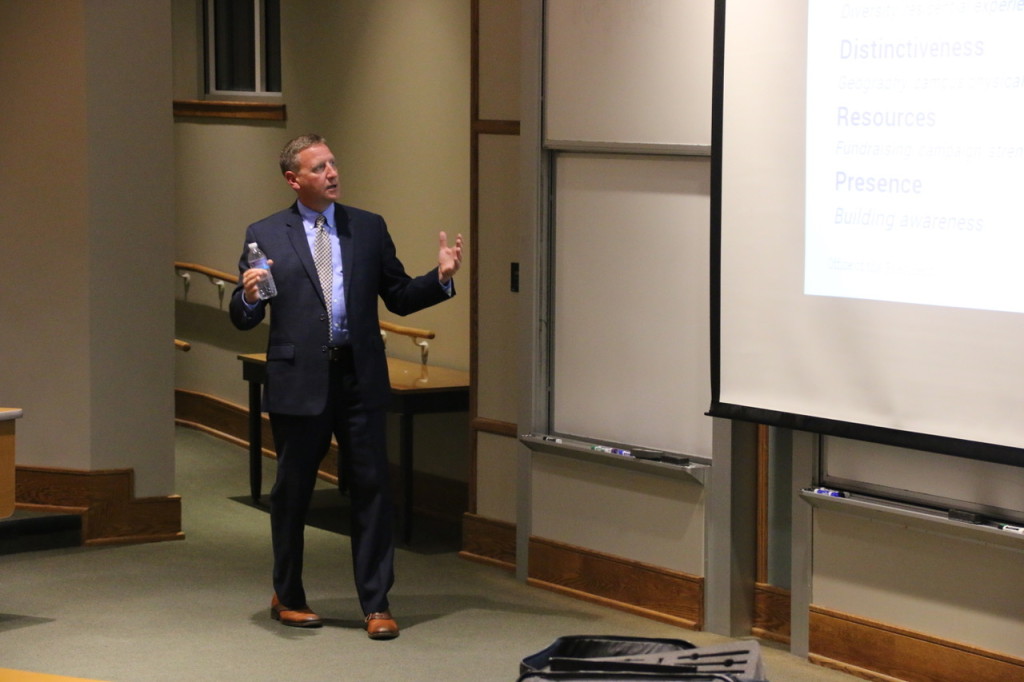
Just two meetings ago, President Troha himself presented the college’s budget to the body of student representatives. He discussed the college’s goals for the future, the introduction of new programs – like Mock Trial and eSports – to enhance the student experience, and reaffirmed the administration’s accountability to the student body.
When I asked about student government as I toured other schools, my questions were often dodged as if I had brought up some kind of scandal. I quickly found that at these schools, student government had no power to enforce their decisions or make any kind of real change. At other schools, these “student governments” represented a single interest group or weren’t committed to action.
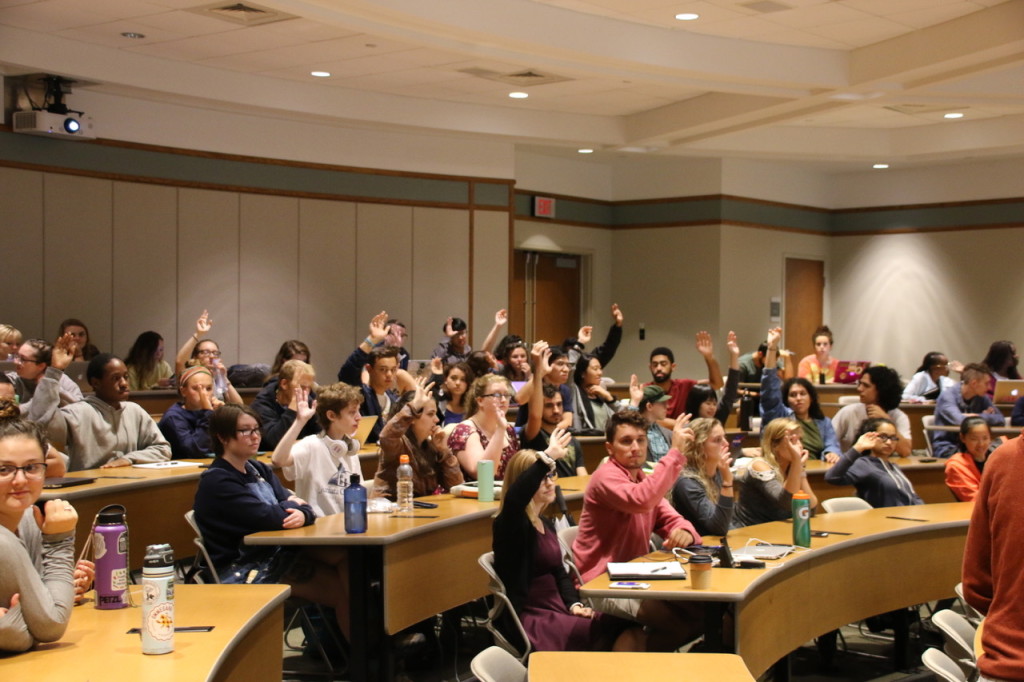
When I first got involved in Student Senate at Juniata in my freshman year, I was amazed at how many groups of students were represented, and further, how much they actually accomplished. Through fair elections in every class, the appointment of 10 senators on behalf of a student advocacy group known as Students Advocating for Universal Respect, and the work of other specific committees, Juniata’s Student Senate beautifully represents students from all classes and identities. Last year, these students were able to get more bike racks and recycling bins on campus and assist in the selection process of a new food provider. These are just a few examples of the collective action of Juniata’s student body.
The experience of working with so many other students to collectively improve the lives of students as Freshman Class President is something I wouldn’t give up for anything. If you’re looking to make change in your new environment, give back to your community, and represent your peers, I suggest Student Senate at Juniata College.
Home Away From Home
This year, Stephanie Letourneau is living at the Raystown Field Station and running her own blog about the adventures there! To not miss any of her updates, follow her blog Pursuing Passions.
Waving hello from the lake!
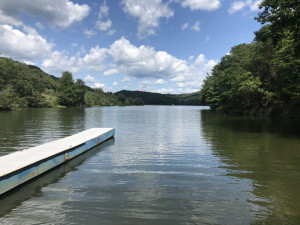
On August 22nd, I successfully moved into the Raystown Field Station. We had a presentation after moving in on field safety and then went down to the fire pit by the lake for s’mores and residential life information.
The schedule at the field station includes having one class all day each day. Our first day was an introduction to the station, tours, and logistics.
My class schedule is:
Mondays – GIS
Tuesdays – Sense of Place Seminar and Nature Photography
Wednesdays – Research
Thursdays – Aquatic Ecology
Fridays – Limnology
Our first class was Limnology on Friday. We have only had a few classes, but so far, we have designed a leaf decomposition study as a class to evaluate nearby ponds and Raystown Lake. Our labs the past two weeks have comprised of going out on the lake on the boat and measuring the lake’s physical and chemical properties.
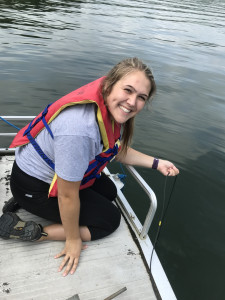
For GIS, we have been exploring the program and practicing creating maps or finding information. I am very excited to learn how to use GIS more and how it can help with my research.
Sense of Place seminar began with a boat tour of Raystown Lake, which included the basic science and history facts of the area. Who knew you could have a lecture on a boat? We also discussed our research projects for the semester. I am not sure what I am exactly studying yet, but I will be researching an acid mine drainage site.
The first two weeks, we did not have anything on Wednesdays because we do not have our research projects established yet. My professor said, “Either make it a very productive day or a really good day.” I did a combination of both; I did some homework in the morning and spent the afternoon kayaking on the lake with some classmates.

Nature photography is a lot of terminology and learning the basic concepts of how to take a good picture. It is particularly difficult to take pictures of wildlife because of their movements so we have learned a lot of specialized techniques so far. Our first project was a picture of a wildflower. I am looking forward to improving my skills.
Aquatic Ecology has been an introduction to ecology and learning the applications of these concepts in aquatic ecosystems. This course is unique because it is taught by Dr. Lane Loya from Saint Francis University.
One afternoon, we had a mini Lake Symposium to listen to researchers discuss the previous studies on Raystown Lake and the potential issues for the future. The presenters included a park ranger from the US Army Corps of Engineers, and from Juniata, Dr. Sharon Yohn and Dr. Chuck Yohn. It is interesting to learn about an ecosystem in which you live and about the different issues that have to be monitored.
I also enjoyed kayaking and going on a firework cruise on the lake with my mom on Labor Day weekend.
From September 10th to 14th, our class at the field station travelled to the Finger Lakes region of New York to study lakes and streams. We stayed at the Cornell Biological Field Station and the USGS Lake Ontario Biological Station. On the way home, we stopped at Cornell Lab of Ornithology. Our Limnology and Aquatic Ecology professors joined us too, which provided an immersive experience to apply everything we have learned and will learn this semester.
I wanted to end this post with some fun from Juniata’s traditions, Lobsterfest (Yes, sometimes I actually go back to campus.) It is an opportunity for students to sign up for clubs and enjoy delicious lobster on the quad.
Another tradition at Juniata is Mountain Day. One day in the fall, classes are canceled, and the school provides buses to take everyone to Seven Points Recreation Area on Raystown Lake for a day of outdoor fun including a picnic lunch, kayaking, slip and slide, inflatables, tug-of-war, and more. However, no one knows in advance when it is going be. As the Juniata website states, “trying to guess the date of Mountain Day is one of the most popular topics of conversation among the students and faculty in the weeks leading up to the event”. It really is. Students and professors will place bets when they think it will be and students will stay up all night if they think it might be the next day.
Luckily, Mountain Day didn’t happen while we were in NY, so we were able to sail the research boat across the lake to join in on the festivities!
Here’s to more adventures and beautiful sunsets on the lake.

